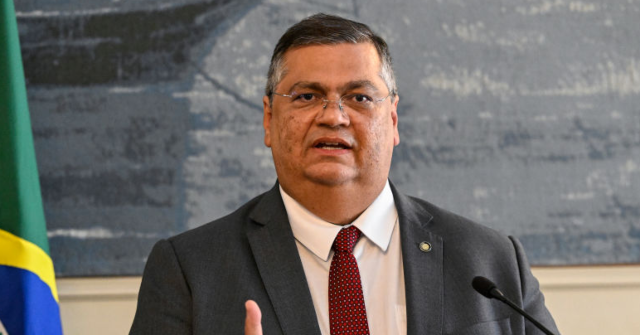Brazilian Supreme Federal Tribunal (STF) Justice Flávio Dino ruled on Monday that all judicial and executive orders issued by foreign governments have no effect in Brazil unless they are ratified by the top court.
Dino ruled that no company or agency operating in Brazil may apply restrictions or blocks based on “unilateral” decisions made by other countries — a measure that directly helps the controversial Justice Alexandre de Moraes, recently targeted with U.S. human rights sanctions under the Global Magnitsky Act. The top court’s decision effectively forbids Brazilian banks from complying with U.S. sanctions by closing de Moraes’ accounts.
“Thus, impositions, restrictions on rights, or instruments of coercion enforced by legal entities incorporated under Brazilian law and having their headquarters and administration in the country,” the ruling reportedly read, “as well as those that have a branch or any professional, commercial, or intermediary activity in the Brazilian market, resulting from determinations contained in unilateral foreign acts, are prohibited.”
Dino issued the ruling as part of an unrelated 2024 case involving the Brazilian Mining Institute’s attempts to prevent several municipalities from the states of Minas Gerais and Espírito Santo from pursuing legal action in British courts over the 2015 Mariana dam tragedy which killed 19 people and caused widespread damages in the affected municipalities.
“Based on the Federal Constitution, the rapporteur [Dino] emphasized that foreign court decisions can only be enforced in Brazil through ratification or in accordance with international judicial cooperation mechanisms,” the STF said in a press release.
“According to the rapporteur, the constitutional principles of national sovereignty and equality among states make it unacceptable for the Brazilian state to submit to the jurisdiction of another country, since nations are considered equal and, therefore, cannot exercise judgment over one another,” the statement continued.
The STF announced that Dino has already notified the top entities of Brazil’s financial system “to comply with the decision, avoiding undue operations, transactions, and impositions, such as contract cancellations, asset freezes, and transfers abroad (or originating abroad) by order of a foreign state.”
Dino is the newest member of the STF, having been nominated to the position by radical leftist President Luiz Inácio Lula da Silva in late 2023. Before joining the top court in 2024, Dino served as Lula’s justice minister, where he repeatedly called for the regulation and censorship of social media in Brazil. Dino was also a member of the Communist Party of Brazil for 15 years until 2021, when he switched to the Brazilian Socialist Party.
According to O Globo, Brazilian banks hired U.S.-based law firms to understand the scope of the Global Magnitsky Act and how they should act — but after the new ruling issued by Dino, the financial entities are now conducting another round of assessments.
The U.S. State Department responded to the ruling with a brief social media statement describing de Moraes as “toxic” to all legitimate businesses and individuals seeking access to the US and its markets. The message was also published in Portuguese by the U.S. Embassy in Brazil.
“No foreign court can invalidate United States sanctions — or spare anyone from the steep consequences of violating them,” the State Department said.
“U.S. persons are prohibited from transacting with him and non-U.S. persons must tread carefully: those providing material support to human rights abusers face sanctions risk themselves,” the message continued.
Vladimir Aras, a former International Cooperation Secretary at the Office of the Brazilian Prosecutor General, explained to the Brazilian outlet UOL that banks will have to “choose a path” between obeying Dino’s ruling or sanctioning de Moraes.
“The decision [for the banks] is purely economic. They need to know what is cheaper. In the Brazilian case, the fine may be low, but the risk is immediate. In the American case, the secondary sanction may take time, but if it comes, it will be heavy,” Aras said.
President Donald Trump signed an executive order in July identifying Brazil as a national security threat to the United States, imposing a 50 percent tariff on Brazilian goods entering the U.S. President Trump cited the ongoing “witch hunt” against conservative former President Jair Bolsonaro and the numerous acts of persecution, censorship, and other human rights abuses against conservative voices committed by de Moraes in recent years as reasons for both the tariffs and the human right sanctions against the STF justice.
“Moraes abused his authority by engaging in a targeted and politically motivated effort designed to silence political critics through the issuance of secret orders compelling online platforms, including U.S. social media companies, to ban the accounts of individuals for posting protected speech,” Secretary of State Marco Rubio explained in July. “Moraes further abused his position to authorize unjust pre-trial detentions and undermine freedom of expression.”
De Moraes spoke with the Washington Post on Monday and justified his controversial actions by claiming that his measures “had helped preserve Brazilian democracy at a time when authoritarianism is rising across the globe.” According to de Moraes, Brazil had been infected by the “disease” of autocracy, and it was his job to apply the “vaccine” — language similar to how Chinese media describes the Tiananmen Square Massacre of 1989.
“There is no way we will back off from what we must do,” de Moraes told the Washington Post, “I say this with complete tranquility.”
Christian K. Caruzo is a Venezuelan writer and documents life under socialism. You can follow him on Twitter here.
Read the full article here


